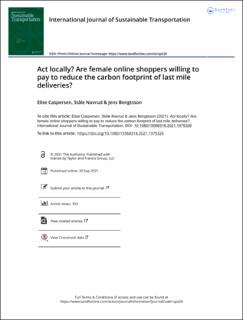| dc.contributor.author | Caspersen, Elise | |
| dc.contributor.author | Navrud, Ståle | |
| dc.contributor.author | Bengtsson, Jens | |
| dc.date.accessioned | 2022-04-12T07:43:48Z | |
| dc.date.available | 2022-04-12T07:43:48Z | |
| dc.date.created | 2021-10-04T14:43:07Z | |
| dc.date.issued | 2021 | |
| dc.identifier.citation | International Journal of Sustainable Transportation. 2021, 1-15. | |
| dc.identifier.issn | 1556-8318 | |
| dc.identifier.uri | https://hdl.handle.net/11250/2990998 | |
| dc.description.abstract | E-commerce results in more last mile deliveries, increased freight traffic and potentially also higher CO2- emissions. This paper is a novel contribution to the literature in terms of investigating consumers’ willingness to pay (WTP) for climate-friendly last mile deliveries through reduced or no CO2-emissions from the delivery. 460 females between 18 and 70 years of age responded to an internet panel survey about their stated preferences for last mile delivery options for online clothing rentals. A discrete choice experiment (DCE) was performed and the data analyzed using both multinomial logit (MNL) and mixed multinomial logit (MMNL) models. The results show that females are willing to pay for CO2-mitigation, and that their WTP increases with consumer income, employment, willingness to change habits to solve the environmental challenges of today, and preferences for sustainable online shopping and delivery alternatives, but decreases with the frequency of online shopping. The WTP for 1 kg CO2 exceeds the WTP for any other aspects of the last mile delivery; i.e. delivery time, delays and information services (notification of departure and arrival). The results indicate that freight operators (carriers) and online retailers can transfer (some of) the costs of climate-friendly last mile delivery to their customers. This is important knowledge for urban planners as it provides support for CO2-mitigating measures aimed at last mile delivery services in order to achieve more environmentally sustainable urban freight transport. | |
| dc.language.iso | eng | |
| dc.title | Act locally? Are female online shoppers willing to pay to reduce the carbon footprint of last mile deliveries? | |
| dc.type | Peer reviewed | |
| dc.type | Journal article | |
| dc.description.version | publishedVersion | |
| dc.source.pagenumber | 1-15 | |
| dc.source.journal | International Journal of Sustainable Transportation | |
| dc.identifier.doi | 10.1080/15568318.2021.1975326 | |
| dc.identifier.cristin | 1943098 | |
| dc.relation.project | Norges forskningsråd: 309977 | |
| dc.relation.project | Norges forskningsråd: 250432 | |
| cristin.ispublished | true | |
| cristin.fulltext | original | |
| cristin.qualitycode | 1 | |
